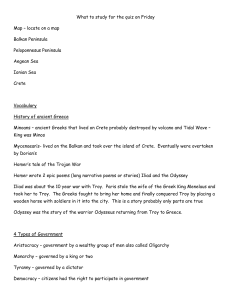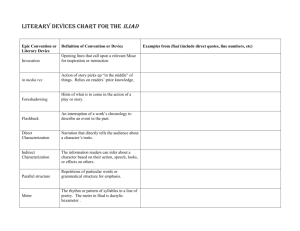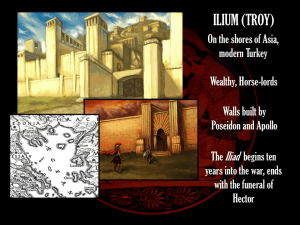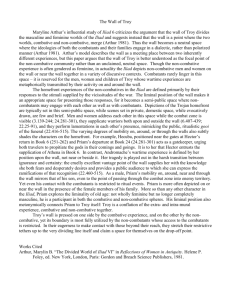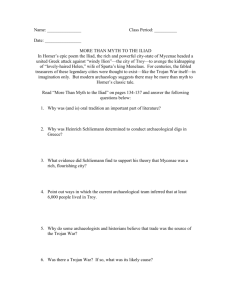Arun Jeevanantham 12/23/15 Section B The Iliad by Homer and The
advertisement
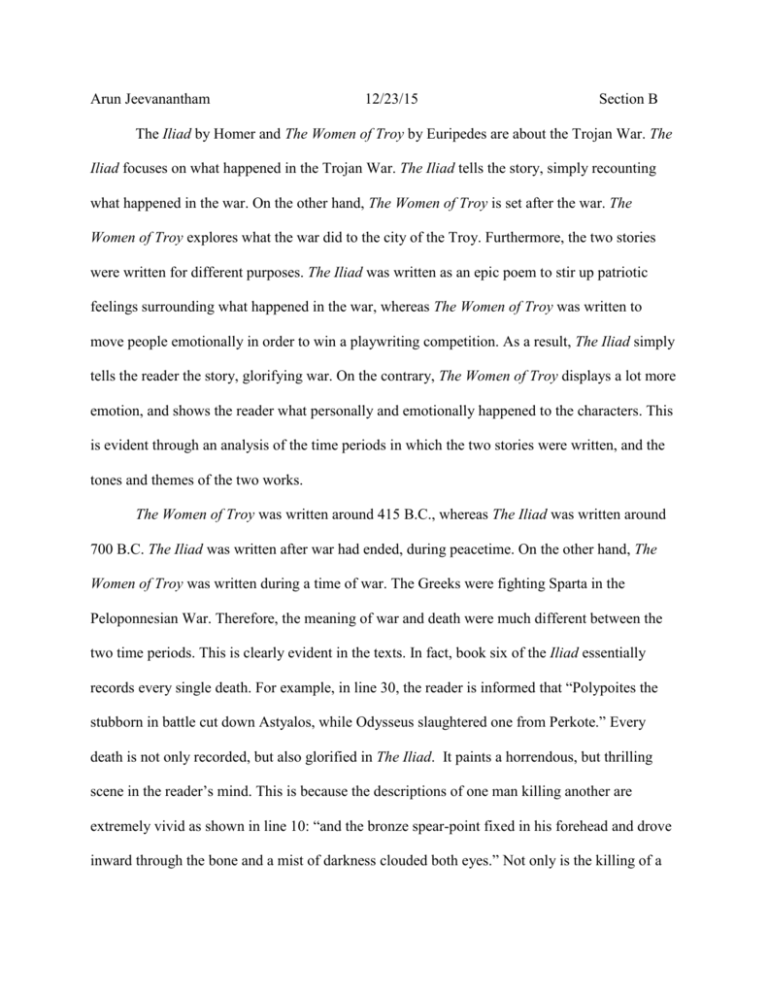
Arun Jeevanantham 12/23/15 Section B The Iliad by Homer and The Women of Troy by Euripedes are about the Trojan War. The Iliad focuses on what happened in the Trojan War. The Iliad tells the story, simply recounting what happened in the war. On the other hand, The Women of Troy is set after the war. The Women of Troy explores what the war did to the city of the Troy. Furthermore, the two stories were written for different purposes. The Iliad was written as an epic poem to stir up patriotic feelings surrounding what happened in the war, whereas The Women of Troy was written to move people emotionally in order to win a playwriting competition. As a result, The Iliad simply tells the reader the story, glorifying war. On the contrary, The Women of Troy displays a lot more emotion, and shows the reader what personally and emotionally happened to the characters. This is evident through an analysis of the time periods in which the two stories were written, and the tones and themes of the two works. The Women of Troy was written around 415 B.C., whereas The Iliad was written around 700 B.C. The Iliad was written after war had ended, during peacetime. On the other hand, The Women of Troy was written during a time of war. The Greeks were fighting Sparta in the Peloponnesian War. Therefore, the meaning of war and death were much different between the two time periods. This is clearly evident in the texts. In fact, book six of the Iliad essentially records every single death. For example, in line 30, the reader is informed that “Polypoites the stubborn in battle cut down Astyalos, while Odysseus slaughtered one from Perkote.” Every death is not only recorded, but also glorified in The Iliad. It paints a horrendous, but thrilling scene in the reader’s mind. This is because the descriptions of one man killing another are extremely vivid as shown in line 10: “and the bronze spear-point fixed in his forehead and drove inward through the bone and a mist of darkness clouded both eyes.” Not only is the killing of a man glorified, but also war is celebrated. This is because The Iliad was written during peacetime, 400 years after the Greeks had won the war. On the other hand, The Women of Troy was written during a time of war. As a result, the Greeks sympathized with those who had died in the name of war. Therefore, instead of just telling what happened, The Women of Troy uses emotion to make the reader feel sorry for the people of Troy. It is set right after Troy is destroyed and shows the tragic sides of war. For example, it references the emotional impact on a family when a dead warrior doesn’t receive a proper burial because “he was not wrapped and laid to rest by his wife’s hands.” In addition, it mentions how the warrior would have “forgotten his children’s faces.” It is clear that The Women of Troy contains a lot more emotion because it causes the reader to sympathize with the all the people who were suffering. This is because the audience recently experienced many of the events happening in the play. These experiences invoked emotion, and caused despair. Therefore, the audience was able to connect with the reader. The main reason that this emotion is present in the The Women of Troy, but not The Iliad, is the time period during which the stories were written. The Women of Troy has a somber tone that carries a lot more emotion than the impersonal, uncaring tone found in The Iliad. In The Women of Troy, the women are desperate as they stand captured outside their ruined city. The writer, Euripides, feels sorry for these women because they are suffering from the aftermath of the Trojan War. In the play, Poseidon describes the ruined city as “stripped, sacked, and smouldering.” Words like “smouldering” have a negative connotation. It is disastrous when something is “smouldering” and “sacked”. Therefore, those words reveal Euripides’ feelings for the people suffering in the ruined city. As a result, Euripides includes a lot more emotion in the play. It is clear that Euripides cares for the people dying when he describes people dying “under the lash of tears.” In contrast, Homer has a very impersonal, uncaring tone in The Iliad. He simply tells what is happening in the war, and expresses very little emotion. Homer does not care that people are suffering and dying. He is more concerned with the glorious action found in the war. Homer makes this clear to the reader when he tells the men to “remember [their] furious valour.” Because Homer has an uncaring tone, he does not make the poem emotional. Therefore, it is clear that the somber tone found in The Women of Troy carries a lot more emotion than the impersonal uncaring tone Homer uses in The Iliad. The Women of Troy has a theme about the horrors of war, whereas The Iliad is centered on the glory of war. These themes directly impact how much emotion is present in the story. A theme that shows the destruction and horror of war allows for more sentimental value than a theme that glorifies war. In The Women of Troy, Euripides describes the aftermath of war as a terrible time. The women are forced to struggle with the loss of their husbands, and must live with the fear of becoming slaves. This was all due to the Trojan War. For example, when Talthybius reveals that the “Greeks are going to kill [Andromache’s and Hector's] son,” the reader learns that the Trojan War had caused a lot of pain and death. Furthermore, there is a lot of emotion present when Euripides discusses the horrors of the war. On the contrary, book six of The Iliad discusses the glory of war. Not only does the poem keep track of every death like a logbook, but it also celebrates warriors as heroes. For example, The Iliad portrays Diomedes a great hero even though he brutally kills many on the battlefield. One example was when he “cut down Axylos.” By referring to people like Diomedes as heroes, Homer illustrates that war is a great thing. The poem is meant to promote Greek nationalism, so Homer uses very little emotion in the poem to dehumanize the deaths. It is clear that The Women of Troy had a lot more emotion because it has a contrasting theme to that of The Iliad. All in all, The Women of Troy has a lot more emotion than The Iliad. This difference in emotion is caused by the time periods in which the two works were written, as well as the tones and the themes found in the two works. Also, it is known that The Women of Troy was written for a playwriting competition. Therefore, the play needed a lot more emotion than the poem by Homer in order to connect to an audience. With the added emotion, The Women of Troy connected with readers and associated war with horrors. On the other hand, The Iliad had a positive connotation with war because it glorified war. Both works depict The Trojan War in their unique ways with The Iliad focusing on the action of the war while The Women of Troy focuses on the aftermath of the war. Combined, the works offer readers a complete story of the war.
